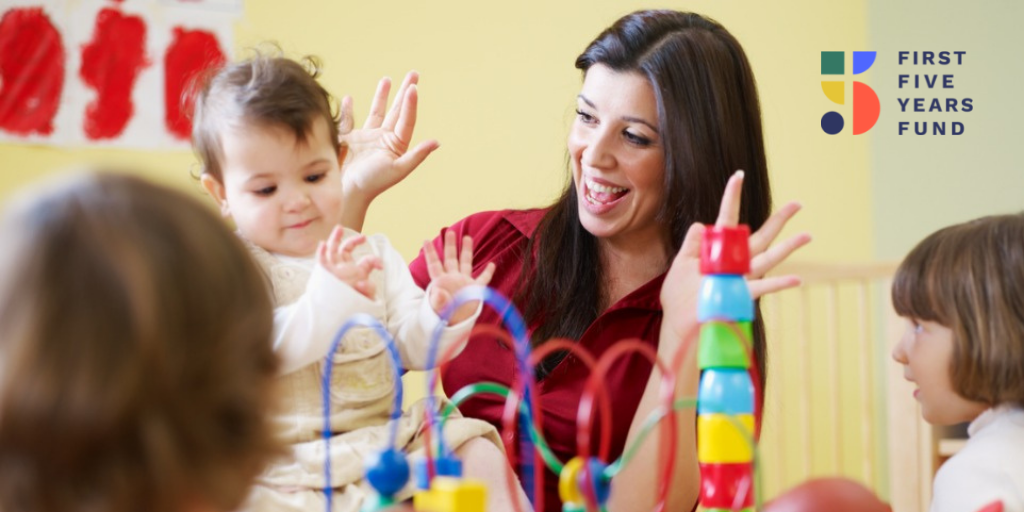How States Are Using PDG B-5 Building Grants to Ensure Child Care Access For All Children

The BUILD Initiative, ZERO TO THREE, and Start Early, recently released a new brief highlighting the strategies states are using to ensure child care access for all children in their Preschool Development Grant Birth through Five (PDG B-5) Renewal applications. This brief highlights how PDG B-5 is being used to build the capacity of early care and education (ECE) systems, create infrastructure, provide direct services, and pilot new work in order to increase access for children with disabilities and improve the capacity of the workforce to serve all children successfully. Their analysis found that states are employing different pilot programs and temporary strategies that are moving the needle in their states, but more federal funding is needed to ensure that they can see this work come to fruition and support young children and their families.
PDG B-5 is a competitive federal grant designed to improve states’ ECE systems. In 2023, 21 states were awarded Planning Grants, and 21 states were awarded Renewal Grants. While the scope of work for planning grantees is to conduct comprehensive needs assessments and draft strategic plans, the renewal grantees focus on implementing their strategic plan. The 21 renewal grantees are using this infusion of federal funding across a wide range of content areas in their ECE systems, and in a variety of ways, such as by serving children in inclusive early learning settings, expanding professional development training, building the supply of child care, and streamlining administrative requirements.
In analyzing PDG B-5 Renewal Grant applications, BUILD found that states have been charting their own course when it comes to ECE system development by working on a variety of projects and initiatives at once. They found that states tend to focus on shorter-term projects for their renewal grants, perhaps because states do not see PDG B-5 as a reliable, continuous funding stream and lack confidence that state funding would be available to sustain the work. States may also be focusing on producing near-term results, or the broad framework of the grant may have led to more responsive strategies.
Over the years there has been consistent data pointing to children with disabilities, as well as children with developmental delays, disabilities, special health needs, and children who have or are experiencing trauma, being excluded from early childhood programs. Many families have difficulty finding and maintaining consistent inclusive early learning experiences for their children. States are using PDG B-5 Renewal funding, along with other sources, to build inclusive child care systems. This includes exploring policies aimed at reducing suspension and expulsions from ECE programs, with a significant focus on improving the capacity of the ECE workforce to support children displaying challenging behaviors. According to BUILD’s analysis, PDG B-5 Renewal plans were most likely to improve inclusion across 3 categories.
- Infant Early Childhood Mental Health (IECMH)
- Professional Learning and Coaching
- Access to Early Childhood Care and Education
Within these three areas, BUILD found that states are adopting 13 strategies, such as expanding infant and early childhood mental health (IECMH) capacity, implementing training and/or coaching, providing financial incentives to providers who serve children with disabilities, and advancing universal screening and referrals, among many others.
PDG B-5 Renewal Grants provide an opportunity for states to create supportive, targeted strategies. Click here to read more about all of the strategies that states are pursuing and read on to see a few examples directly from BUILD of how states are using PDG B-5 Renewal grant funds to improve access to child care.
Infant Early Childhood Mental Health (IECMH)
States proposed various trauma-informed strategies based on infant early childhood mental health.
- Idaho is building statewide capacity to support IECMH best practices via a partnership with The Idaho Association for Infant and Early Childhood Mental Health (AIM Early) to support foundational IECMH training and hire trainers/coaches to conduct training for educators and families. They will also increase the number of ECE workforce members with AIM endorsement by using PDG Renewal funds to cover both the costs of the endorsement and membership in AIM.
Professional Learning and Coaching
16 states are using PDG Renewal funds to provide training and coaching focused on trauma-informed practices, 13 of which are continuing or scaling Pyramid Model training and classroom coaching.
- Vermont is funding “Touchpoints training” for professionals across the early childhood system including child care educators, family child care providers, home visitors, pediatricians and pediatric nurse practitioners, early interventionists, and child welfare workers.
Access to Early Childhood Care and Education
12 states are using PDG B-5 Renewal funds to implement, expand, and improve screening and assessment systems, increasing the supports to families with navigators, targeting populations such as refugee and immigrant communities, and training family leaders to conduct assessments such as the Ages and Stages Questionnaire (ASQ).
- New Mexico will establish a “Coordinated Intake and Referral system” for home visiting and early intervention. The goal is to improve coordination of services for families, prioritizing their needs and preferences and minimizing duplication of services.
Throughout 2023, BUILD will continue to produce briefs highlighting how states are using PDG B-5 renewal grants, focusing on the following strategies: Workforce Compensation, Systems Building through Governance Processes, Supporting Multilingual Learners, Career Pathways, Mixed Delivery Systems, and Financing.
This is part of a larger blog series, find the rest of our PDG series here.
Subscribe to FFYF First Look
Every morning, FFYF reports on the latest child care & early learning news from across the country. Subscribe and take 5 minutes to know what's happening in early childhood education.


